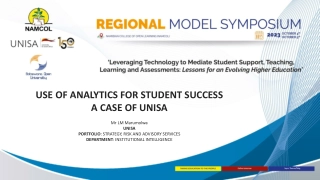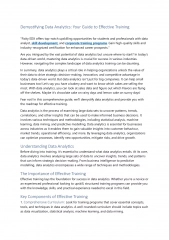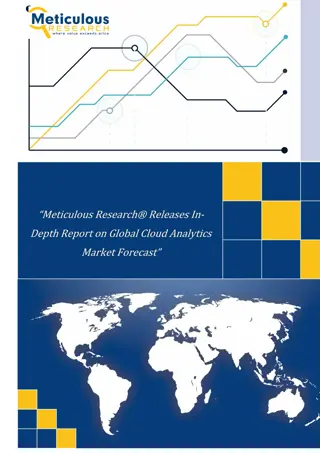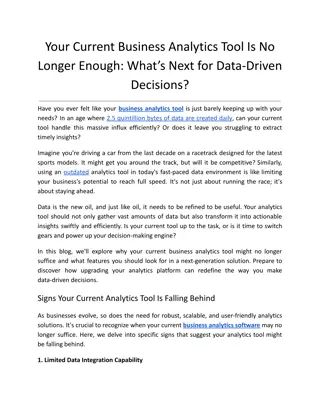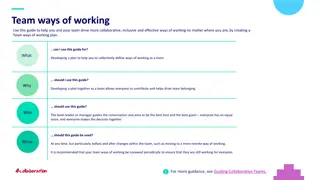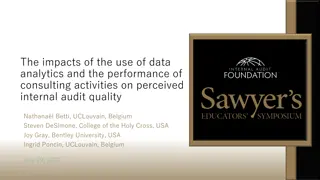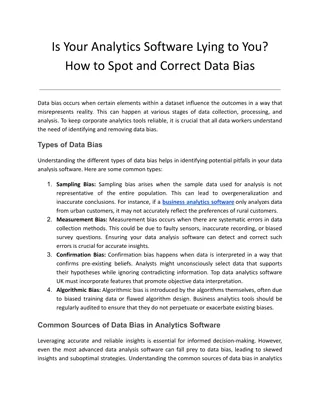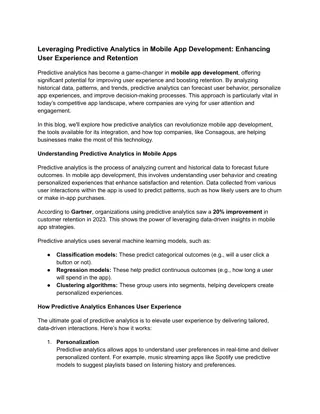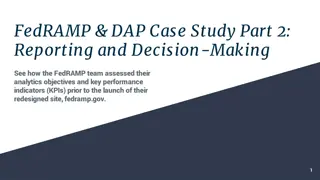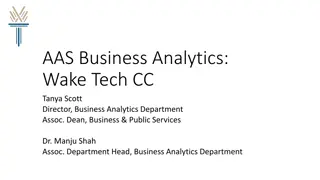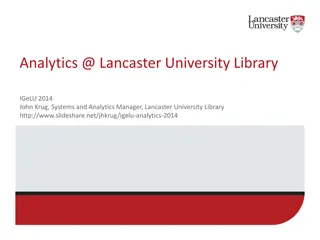
Unlocking the Power of Business Analytics for Sustainable Growth
Explore the world of business analytics and how it drives value creation, operational efficiencies, and strategic decision-making. Learn about the importance of analytics in understanding customers, improving processes, and fostering continuous improvement. Discover how analytics can explain past performance, predict future events, and prescribe optimal strategies for resource allocation.
Download Presentation

Please find below an Image/Link to download the presentation.
The content on the website is provided AS IS for your information and personal use only. It may not be sold, licensed, or shared on other websites without obtaining consent from the author. If you encounter any issues during the download, it is possible that the publisher has removed the file from their server.
You are allowed to download the files provided on this website for personal or commercial use, subject to the condition that they are used lawfully. All files are the property of their respective owners.
The content on the website is provided AS IS for your information and personal use only. It may not be sold, licensed, or shared on other websites without obtaining consent from the author.
E N D
Presentation Transcript
https://www.eventbrite.com/e/shidler-leadership-talks-how-to-build-a-great-analytics-team-tickets-43740110849?aff=es2https://www.eventbrite.com/e/shidler-leadership-talks-how-to-build-a-great-analytics-team-tickets-43740110849?aff=es2 https://www.eventbrite.com/e/shidler-leadership-talks-how-to-build-a-great-analytics-team-tickets-43740110849?aff=es2 1
Business analytics .. Is any data driven process that provides useful insight .. Insights from analytics can be leveraged to create value (ie, improve profits, build customer loyalty, reduce costs of business, etc.) .. Drive sustainable product and firm differentiation which can create competitive advantage (cost and quality advantages) .. Focus on understanding customers, markets, competitors, employees, etc. ..Has been around for ever under different names, but IT now allows automation and prediction which requires 2
Business analytics .. Can be used to focus on improving operational efficiencies such as logistics and production efficiencies ..Can be used to focus on customer and vendor relationships .. Improve and automate managerial decision making .. Help culture of continuous improvement, but please don t shoot the messenger! .. Behind trend of meetings switching up from passive .pptx to active dashboards .. You can t drive improvement if you don t track measures 3
Business analytics explain to a firm what happened in their profits and performance (automated reports, dashboards, descriptive statistics) Why it happened (inferential statistics (ie regression), experiments, isolate levers that lead to results) What will happen (forecasting, predictive analytics) What should we do (prescriptive analytics, optimization how to best allocate resources) 4
Common analytics Reporting summarization of historical data Trending identification of underlying patterns in time series data Segmentation identification of similarities within data Predictive Modeling prediction of future events using historical data Analytics must have business relevance, provide actionable insights, and provide performance measurement and value measurement Value is only created if analytics drive process improvement Does any of this seem important and necessary? 5
OK whats the analytics process? Raw transaction or textual data need to be transformed, filtered, aggregated, mined, visualized, presented and used in managerial decision making (automated or not) this mastery over data requires a lot of competency and IT assets 6
Analytics is about driving change Insights without action are worthless Be the change agent Must move beyond Excel databases which do not scale 7
Analytics enable differentiation Competitive differentiation comes from specialization Specialization comes at a cost of training and experience Deep skills, time, investments all carry heavy sunk costs Need people, technology, data, training processes, assets, competencies 8
How do I build an analytics team? First make a decision to run your business on numbers and facts (insights from analytics) rather than intuition and gut feeling . And use the insights, good or bad Your firm will require: people employees and maybe consultants competencies nurtured skillsets processes automated operations to produce insight and decision-making data records of transactions, perhaps textual data as well technology - infrastructure 9
Analytics Specialists - People Employees with skillsets and varying ability to understand management needs and business processes Its hard to find IT employees at the salary you expect, this causes an over reliance on consultants that can hold you hostage Where do you find trained analysts, IT specialists? Maybe from consulting companies, colleges, post ads on online training platforms Please make a commitment for a 2 or 3 year hire, rather than pull the plug if results do not appear quickly. Skills only develop with practice 10
Analytics Specialists - People May be impossible to hire analysts or IT people at the payrate you want to. If you can t then give them the pay you can but require fewer hours. HR people cannot adequately screen and hire IT people (perhaps consider using a consultant to build your team) The interview should include a hands-on component (ie slice up data and give a presentation within 60 minutes) To build the analytics team the budget needs to be approved ahead of time Hire or maybe just train your accountants? Good perks to aid in retention are regular training in nice destinations 11
Analytics Specialists - People Different people have different strengths, so build a team People are responsible to create the new processes and assets People require confidence, encouragement, and support People require persistence to battle technology and bend it to their will Analytics team should be BPR specialist to manage change in processes rather than make reports The area manager and analyst must work together to design new KPI s and improve processes People are responsible to manage, upgrade and integrate the underlying data/IT systems, and IT assets As complexity of projects increases, so does the coordination required 12
Analytics Processes Series of orchestrated activities designed to create an outcome Turn raw data into actionable insights that humans or computers can grasp to monitor business performance or aid in decision making Processes turn raw data streams into decision support tools Must be documented and automated so they can survive employee turnover Processes can be reliable or unreliable, strongly defined or weakly defined, automated, semi, or not automated 13
Data Quantifiable measures cleaned, verified, harmonized, stored in a database, and available for analysis Structured data should live in operational databases, cleaned and copied into read-only data warehouses, and aggregated into cubes, reports, etc. Should be segmented into dimension data (words, such as categorical) and measures (numbers and dates) Careful with level of granularity when combining data Data is only as accurate as you constrain (make) it to be 14
IT Assets Reports, predictive models, statistical models, new data processes, stored procedures, data marts, ETL routines, data entry systems, etc. IT Assets must be automated and repeatedly used by an individual other than the individual that created it Assets are generated by an IT/functional team under the guidance of management needs. The IT team uses various competencies (skills & experience) to create catalogued analytics assets Assets need to be documented and protected, they are very valuable If you use a consultant be sure you are buying the asset rather than just using it. 15
Employee Competencies Competencies include: ability to perform data modeling, create ETL scripts, create insightful reports, self-refreshing dashboards with custom KPI s, ability to operationalize insights Competencies are applied using technology tools to create assets such as new reports, processes, KPI s used to drive change, and performance, documentation, etc. Competencies are applied using IT tools and technology stacks (ie Microsoft, amazon, SAP) Tools are often combined into an analytical platform Whom should have the competency? Managers/support staff in all disciplines because they know what questions to ask and KPI s needed 16
Competencies ..are used to manipulate technology tools to create assets such as new reports, new KPI s, new automated alerts, automated decision making such as vendor ratings and rankings Competencies are team based and take time to develop. Once you have trained employees, then apply the competencies into as many business areas as possible. Analytics enable competitive differentiation which comes from specialization. Specialization comes at a cost of deep skills, business-IT alignment and strategy plan, investments in people and IT Hard to buy because managers do not value what they don t understand. (UH-banking student) and there is always development pain before payback 17
Assets are combined into analytics platform Discovery environment ad hoc, exploratory analysis, tableau/power BI, pivot charts, self-service analysis, modeling Operational environment productionized reports that arrive in email inbox, or updated dashboard, assets need to be validated for accuracy, made reliable, to provide repeatable insights just like electricity it should just work Hopefully the operational assets are applied automatically to provide alerts or change processes depending on changes in data (ie auto changes in production quantities based on inventory aging data, or suggestions to change price 18
What drives analytics success and business progress? The organization must have a very strong data management plan with data governance team The company needs to be open to innovation and implementation and hearing both the good and bad news that analytics will tell you Focus business insight activities on problem solving rather than pretty charts. All activities must have relevance Experimentation Embracing the concept of creative destruction Responses to info requests must be timely Mutual trust between business managers and IT team Each department should have analysts and capabilities rather than only a centralized analytics team (matrix management) 19
Should my firm build an analytics competency? If you don t you are dooming your firm to mediocrity and inefficiency Innovation means taking chances, calculated chances Taking new opportunities requires analysis Increasing what we know and decreasing what we don t know is important for managerial decision making Analytics should be automated, not hours and days of excel copy and paste 20
Featherman you gave me a headache! Can I just outsource my analytics? You can outsource the creation of a basic set of productionized reports (which requires you to leverage an entire full stack of technology), but it is often not possible to afford the outsource of exploratory analysis that is needed on a day to day basis Analytics are very closely tied to data entry, data storage and data management systems so that analytics evolves over time. You can t outsource this. Ignoring the need to develop new competencies in employees generally leads to unchanged outcomes Analytics goes hand in hand with operational management so hard to have success with outsourcing 21
Dr. Feathermans Final words Your analytics team should not be dispensing advice to the rest of the company or be tied up in fire drill ad-hoc analysis rather They should be publishing tools and assets that other s use in a self-service mode DBA s work for the IT dept., analysts should work in functional departments. Put the calculations into the database scripts and stored procedures not into the reports. Analysts should work with managers to improve processes, generating KPI s and decision making Should work to automate decision making and report dissemination as much as possible (such as the auto-recommendation to a sales rep to offer a bundle to a client in a known target market) Don t be afraid to innovate 22
Mauricio Featherman, Ph.D. Associate Professor of Information Systems Carson College of Business Washington State University featherman@wsu.edu freelance consulting in HCMC in July 23

